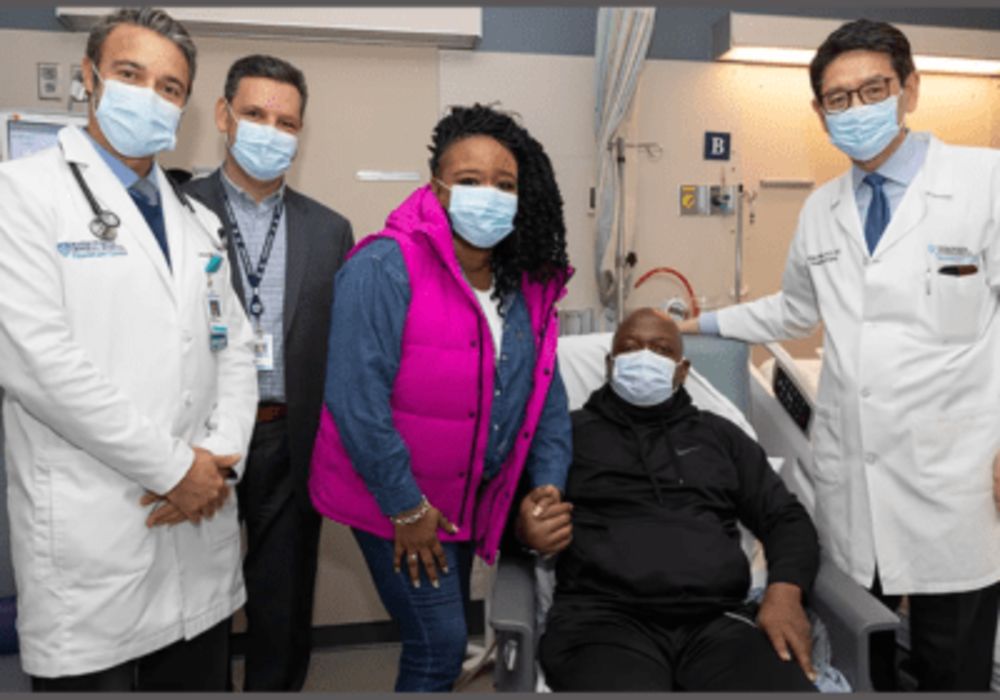Rick Slayman (seated) pictured with his partner and team of doctors
A 62-year-old man named Richard "Rick" Slayman from Weymouth, Massachusetts, has been discharged today from Massachusetts General Hospital (MGH) after receiving a groundbreaking kidney transplant from a genetically modified pig. The surgery took place on March 16 and lasted four hours. This success is considered a historic milestone in transplantation, as previous attempts with genetically modified pig organs had failed. The frontier of organ transplantation has reached new heights, and xenotransplantation could bring hope for addressing the global organ shortage.
Recent advancements in genetic engineering for xenotransplantation
Mr. Slayman had been suffering from end-stage kidney disease and had previously undergone a human kidney transplant in 2018, which began to fail last year. The idea of a pig kidney transplant was raised by his doctors as an alternative. The genetically modified pig kidney he received was developed by the Cambridge-based pharmaceutical company eGenesis. It was engineered to remove harmful pig genes and incorporate certain human genes to enhance compatibility with humans. Advancements in genetic engineering have made pig organs more compatible with the human immune system. Specifically, "10-gene pigs" have been developed, with genetic modifications to prevent adverse reactions and make the organs more suitable for human transplantation.
Regulatory Approval and MGH's Legacy in Transplantation
In a pivotal moment in an operating theatre, surgeons connected a pig's kidney to a human, awaiting the body's reaction. If the body rejected the organ due to "hyperacute rejection," the organ would turn black within minutes. However, if successful, the organ would turn pink, indicating acceptance. Following the surgery, Mr. Slayman's new kidney is functioning well, and he no longer requires dialysis. He expressed his joy at being able to return home and resume a normal life, free from the burdens of dialysis. The transplant procedure was approved by the Food and Drug Administration (FDA) under an Expanded Access Protocol, also known as compassionate use, which allows patients with life-threatening illnesses to access experimental treatments. MGH highlighted its legacy in transplantation, having conducted the world's first successful human organ transplant (a kidney) in 1954, as well as its collaboration with eGenesis on xenotransplantation research over the past five years.
Addressing the Global Organ Shortage: Potential Benefits of Xenotransplantation
Experts believe that this breakthrough could potentially address the global organ shortage, particularly benefiting ethnic minority communities disproportionately affected by the shortage. Dr. Winfred Williams, Mr. Slayman's doctor at MGH, emphasised the potential of this technology to achieve health equity and provide effective kidney transplants to all patients in need. According to data from the United Network for Organ Sharing, over 100,000 Americans need a lifesaving organ transplant, with kidneys being the most commonly needed organ. In 2023, there were just under 23,500 donors (both deceased and living), leading to an estimated 17 deaths per day in the US among those waiting for an organ transplant.
While this is the first successful pig kidney transplant into a human, previous attempts at pig heart transplants were unsuccessful, with recipients surviving only a few weeks post-procedure due to organ rejection, a common risk in transplantation. Despite challenges and uncertainties, such as the anatomical differences between pig and human hearts and the potential need for further genetic modifications, xenotransplantation has achieved significant milestones and holds further promise. It aims to save lives by providing a larger supply of viable organs, even if they are not as effective as human organs. Further research and clinical trials are required to determine its long-term viability and potential to revolutionise transplant medicine.
Source & Image Credit: BBC























